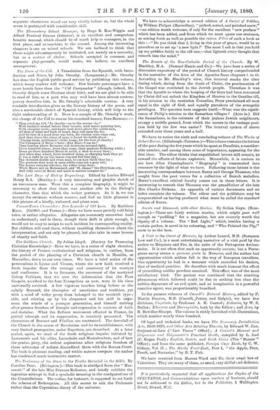The Gallican Church. By Julius Lloyd. (Society for Promoting Christian
Knowledge.)—Here we have, in a series of slight sketches,
the history of France, ecclesiastical and religious, in outline, from the period of the planting of a Christian church in Massilia, or Marseilles, down to our own times. We have a brief notice of the persecutions in Lyons and Vienne, where the new faith received a fresh impulse from the courage and constancy of its martyrs and confessors. It is to Irenaeus, the successor of the martyred bishop Pothinus, that we owe the information that the Four Gospels, ascribed to the four Evangelists as now, were in his time universally received. A few vigorous touches bring before us the saintly Bernard, the champion of asceticism and tradition, yet with a mind of wider grasp than belonged to the monkish type ; able, and stirring up by his eloquence and his skill in argu- ment the minds of a younger generation, and himself striving after greater freedom of thought and expression in matters of faith and doctrine. What the Reform movement effected in France, its partial triumph and its suppression, is concisely presented. The characters of Bossuet and Fe'nelon are contrasted. The downfall of the Church iu the storm of Revolution and its re-establishment, with very limited prerogative, under Napoleon, are described. At a later period, again, we read of the fresh religious impulse initiated by Lamennais and his allies, Lacordaire and Montalembert, and of how the genius, piety, the ardent aspirations after religious freedom of these advocates of reform discredited them with the Roman Court. The book is pleasant reading, and within narrow compass the author has condensed much instructive matter.


































 Previous page
Previous page